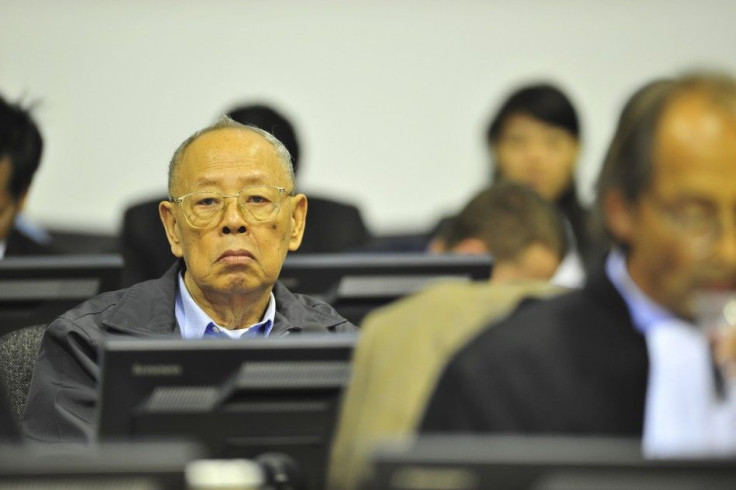A Few More Missed Paychecks, And Khmer Rouge War Criminals Could Die Free

Ailing, aging defendants and insufficient funds are delaying tribunal proceedings in Cambodia, making it increasingly likely that alleged perpetrators of some of the worst war crimes in history could go to their graves without ever being held accountable.
The Extraordinary Chambers in the Court of Cambodia -- the formal name of the tribunal -- is backed by the United Nations. The special court was established in 2005 to try Khmer Rouge officials, and has delivered exactly one verdict so far.
Kaing Guek Eav, 70, former overseer of a prison camp where thousands of people were executed, was charged with war crimes in 2007 and convicted by the tribunal in 2010. He will spend the rest of his life behind bars.
But three defendants still remain: Noun Chea, Ieng Sary and Khieu Samphan. All are in their eighties and showing signs of frailty. If any of their health problems become serious, there is a precedent for case dismissal; another former defendant, Ieng Thirith, was deemed unfit for trial in November 2011 due to a loss of mental faculties resulting from Alzheimer’s disease.
The U.N. is partnering with Cambodia to fund the trial, and has covered its own expenses. But Cambodia is responsible for footing a number of costs, including salaries for Cambodian staffers, transportation, security and basic utilities.
Salaries in particular seem to be stretching Cambodian coffers a little too thin, even with help from foreign donors. As a result, hundreds of court staffers have received no pay since November -- and many of them suspect the government doesn’t really want to keep the tribunal going.
“The government won't pay these salaries. They just want this court to shut down," said one staffer to Reuters. "By creating this situation, they just want to embarrass the U.N."
European Union officials seem to agree. On Thursday the EU, one of the donors backing the tribunal via the U.N., threatened to hold back a payment of about $US400,000 unless Cambodia lives up to its end of the deal.
If these disputes drag on long enough, it may allow the three defendants -- all top leaders of the brutal Khmer Rouge regime -- to escape prosecution for the heinous crimes they committed against Cambodians more than three decades ago.
The Khmer Rouge began as a guerrilla movement in Cambodia during the 1960s; the organization’s leaders championed an extreme form of communism and presented themselves as liberators.
But after they rolled into the capital city of Phnom Penh in 1975, they quickly acquired a reputation for ruthlessness. Khmer Rouge leaders, led by the notorious dictator Pol Pot, sought to establish an agrarian society unburdened by social hierarchies. To do this, they implemented forced evacuations and summarily executed intellectuals, dissenters and officials from the deposed regime.
In the four years following the Khmer Rouge’s rise to power, about 2 million people lost their lives.
Pol Pot died in 1998 a free man, although he was at that time living the life of an insurgent and on the verge of being turned over to an international tribunal.
Today, the government -- nominally a constitutional monarchy -- is led by Prime Minister Hun Sen, who has been in power since 1985. This shadowy strongman was once a Khmer Rouge guerrilla, but he defected before the regime fell in 1979. Hun Sen was installed in the Phnom Penh government by the Vietnamese invaders who overthrew the Khmer Rouge, and his strong hold on power has stifled Cambodia’s progress.
Today, Cambodia is underdeveloped and poverty-stricken, with a GDP per capita of about $US900. There is room for hope; the World Bank predicts an average annual GDP growth rate of 7 percent through 2017. But growth is easy when there’s nowhere to go but up.
Building a resilient economy will take some time and leadership. Right now, export earnings are based almost entirely on clothes manufacturing and agriculture, and that lack of diversification has left the economy vulnerable to shocks.
Hun Sen has not done himself any favors when it comes to public opinion -- in a country where unequal distribution of wealth is a glaring issue, the onetime Communist is an ardent champion of trickle-down economics.
Cambodia also has a poor record when it comes to transparency. The media is muzzled, opposition parties are intimidated into submission, and corruption is rife; many of Hun Sen’s family members have top spots in the administration.
Human rights abuses are also a serious problem. Freedom of assembly is close to nil, dissent is suppressed, and government-forced evictions have been common ever since the Khmer Rouge dismantled the very concept of property ownership.
It is easy to see why the very concept of accountability might be a distasteful one for Hun Sen and his peers, which is why unpaid staffers at the Khmer Rouge tribunal suspect foul play behind their delayed paychecks.
The longer the tribunal is delayed, the older the remaining defendants will get. And if they die before a verdict -- a prospect that grows increasingly likely -- it will be just one more injustice for the Cambodian people to suffer.
© Copyright IBTimes 2024. All rights reserved.












